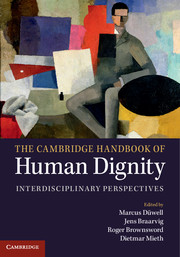Book contents
- Frontmatter
- Contents
- List of contributors
- Foreword
- Why a handbook on human dignity?
- Acknowledgments
- 1 Human dignity from a legal perspective
- 2 Human dignity: concepts, discussions, philosophical perspectives
- Part I Origins of the concept in European history
- Part II Beyond the scope of the European tradition
- Part III Systematic conceptualization
- Part IV Legal implementation
- Part V Conflicts and violence
- Part VI Contexts of justice
- 51 Human dignity and social welfare
- 52 Dignity and global justice
- 53 Human dignity and people with disabilities
- 54 Human dignity as a concept for the economy
- 55 Human dignity and gender inequalities
- 56 The rise and fall of freedom of online expression
- Part VII Biology and bioethics
- Appendix 1 Further reading
- Appendix 2 Universal Declaration of Human Rights
- Index
- References
55 - Human dignity and gender inequalities
from Part VI - Contexts of justice
Published online by Cambridge University Press: 05 March 2015
- Frontmatter
- Contents
- List of contributors
- Foreword
- Why a handbook on human dignity?
- Acknowledgments
- 1 Human dignity from a legal perspective
- 2 Human dignity: concepts, discussions, philosophical perspectives
- Part I Origins of the concept in European history
- Part II Beyond the scope of the European tradition
- Part III Systematic conceptualization
- Part IV Legal implementation
- Part V Conflicts and violence
- Part VI Contexts of justice
- 51 Human dignity and social welfare
- 52 Dignity and global justice
- 53 Human dignity and people with disabilities
- 54 Human dignity as a concept for the economy
- 55 Human dignity and gender inequalities
- 56 The rise and fall of freedom of online expression
- Part VII Biology and bioethics
- Appendix 1 Further reading
- Appendix 2 Universal Declaration of Human Rights
- Index
- References
Summary
A particular challenge of considering human dignity and gender inequalities together lies in the fact that discussions about gender inequalities rarely make any reference to human dignity. Another difficulty arises from the expansiveness and variegated nature of the category of ‘gender inequalities’. As groups, women and gender minorities still face inequalities in many areas of daily life, but the institutional, social, material and psychological aspects of these inequalities differ greatly among various geographical, economic and cultural contexts. ‘Gender’ as a category of difference and a basis for unequal treatment cannot and should not be reduced to mean only women, but the debates, especially in the context of international human rights, have to date focused almost entirely on women's rights and women's empowerment, leaving gender minorities in the margins. Yet while human dignity and gender inequalities have seldom been discussed in connection with each other, the perspective of gender can offer a critical heuristic to examine how appeals to dignity might implicitly and inadvertently reinscribe norms of gender, race, class, ableness, sex and sexuality. With this critical perspective in place, dignity as a philosophical concept can be productive in a feminist context to foreground the relation among social respect, self-respect and agency as central to ongoing emancipatory struggles (cf. Cornell 2002). Laying claim to one's dignity, regardless of one's gender, can attain the force of a critical moral act, particularly in situations where individuals are socially, culturally or politically denied the freedom of enacting a moral vision of themselves and the world. Just as the full enactment and experience of one's own dignity requires social respect, social respect without self-respect remains a limited actualization of an individual's human dignity. To the extent that it is useful to approach gender inequalities as infringements on individuals’ human dignity, abolishing inequalities requires social and cultural changes alongside legal, political and economic advances. To circumscribe the relationship between human dignity and gender inequalities, this chapter will first consider key United Nations (UN) documents to trace the conceptual expansion in the treatment of gender issues from that of equal rights and the protection of individuals from violence to a broader agenda of women's empowerment. The second part of the chapter will outline the conceptual difficulties in drawing on the concept of human dignity in the struggle to overcome gender inequalities.
- Type
- Chapter
- Information
- The Cambridge Handbook of Human DignityInterdisciplinary Perspectives, pp. 498 - 504Publisher: Cambridge University PressPrint publication year: 2014



